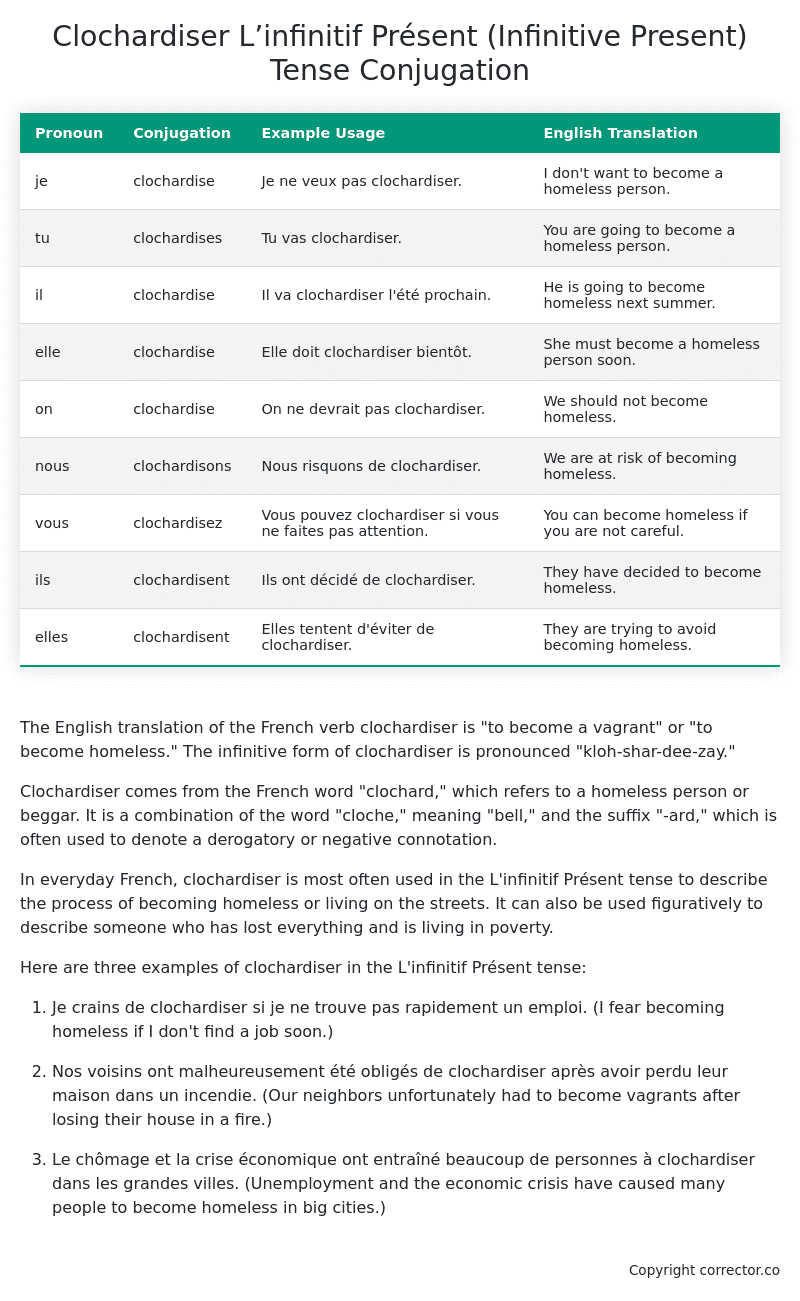L’infinitif Présent (Infinitive Present) Tense Conjugation of the French Verb clochardiser
Introduction to the verb clochardiser
The English translation of the French verb clochardiser is “to become a vagrant” or “to become homeless.” The infinitive form of clochardiser is pronounced “kloh-shar-dee-zay.”
Clochardiser comes from the French word “clochard,” which refers to a homeless person or beggar. It is a combination of the word “cloche,” meaning “bell,” and the suffix “-ard,” which is often used to denote a derogatory or negative connotation.
In everyday French, clochardiser is most often used in the L’infinitif Présent tense to describe the process of becoming homeless or living on the streets. It can also be used figuratively to describe someone who has lost everything and is living in poverty.
Here are three examples of clochardiser in the L’infinitif Présent tense:
-
Je crains de clochardiser si je ne trouve pas rapidement un emploi. (I fear becoming homeless if I don’t find a job soon.)
-
Nos voisins ont malheureusement été obligés de clochardiser après avoir perdu leur maison dans un incendie. (Our neighbors unfortunately had to become vagrants after losing their house in a fire.)
-
Le chômage et la crise économique ont entraîné beaucoup de personnes à clochardiser dans les grandes villes. (Unemployment and the economic crisis have caused many people to become homeless in big cities.)
Table of the L’infinitif Présent (Infinitive Present) Tense Conjugation of clochardiser
| Pronoun | Conjugation | Example Usage | English Translation |
|---|---|---|---|
| je | clochardise | Je ne veux pas clochardiser. | I don’t want to become a homeless person. |
| tu | clochardises | Tu vas clochardiser. | You are going to become a homeless person. |
| il | clochardise | Il va clochardiser l’été prochain. | He is going to become homeless next summer. |
| elle | clochardise | Elle doit clochardiser bientôt. | She must become a homeless person soon. |
| on | clochardise | On ne devrait pas clochardiser. | We should not become homeless. |
| nous | clochardisons | Nous risquons de clochardiser. | We are at risk of becoming homeless. |
| vous | clochardisez | Vous pouvez clochardiser si vous ne faites pas attention. | You can become homeless if you are not careful. |
| ils | clochardisent | Ils ont décidé de clochardiser. | They have decided to become homeless. |
| elles | clochardisent | Elles tentent d’éviter de clochardiser. | They are trying to avoid becoming homeless. |
Other Conjugations for Clochardiser.
Le Present (Present Tense) Conjugation of the French Verb clochardiser
Imparfait (Imperfect) Tense Conjugation of the French Verb clochardiser
Passé Simple (Simple Past) Tense Conjugation of the French Verb clochardiser
Passé Composé (Present Perfect) Tense Conjugation of the French Verb clochardiser
Futur Simple (Simple Future) Tense Conjugation of the French Verb clochardiser
Futur Proche (Near Future) Tense Conjugation of the French Verb clochardiser
Plus-que-parfait (Pluperfect) Tense Conjugation of the French Verb clochardiser
Passé Antérieur (Past Anterior) Tense Conjugation of the French Verb clochardiser
Futur Antérieur (Future Anterior) Tense Conjugation of the French Verb clochardiser
Subjonctif Présent (Subjunctive Present) Tense Conjugation of the French Verb clochardiser
Subjonctif Passé (Subjunctive Past) Tense Conjugation of the French Verb clochardiser
Subjonctif Imparfait (Subjunctive Imperfect) Tense Conjugation of the French Verb clochardiser
Conditionnel Présent (Conditional Present) Tense Conjugation of the French Verb clochardiser
Conditionnel Passé (Conditional Past) Tense Conjugation of the French Verb clochardiser
L’impératif Présent (Imperative Present) Tense Conjugation of the French Verb clochardiser
L’infinitif Présent (Infinitive Present) Tense Conjugation of the French Verb clochardiser (this article)
Struggling with French verbs or the language in general? Why not use our free French Grammar Checker – no registration required!
Get a FREE Download Study Sheet of this Conjugation 🔥
Simply right click the image below, click “save image” and get your free reference for the clochardiser L’infinitif Présent tense conjugation!

Clochardiser – About the French L’infinitif Présent (Infinitive Present) Tense
Forming the Infinitive Present
Common Everyday Usage Patterns
As a Verb’s Dictionary Form
After Modal Verbs
As an Imperative
In Infinitive Clauses
Interactions with Other Tenses
Present Tense
Future Tense
Conditional Tense
Passé Composé
Imperfect Tense
Subjunctive and Conditional Moods
Summary
Want More?
I hope you enjoyed this article on the verb clochardiser. Still in a learning mood? Check out another TOTALLY random French verb conjugation!


